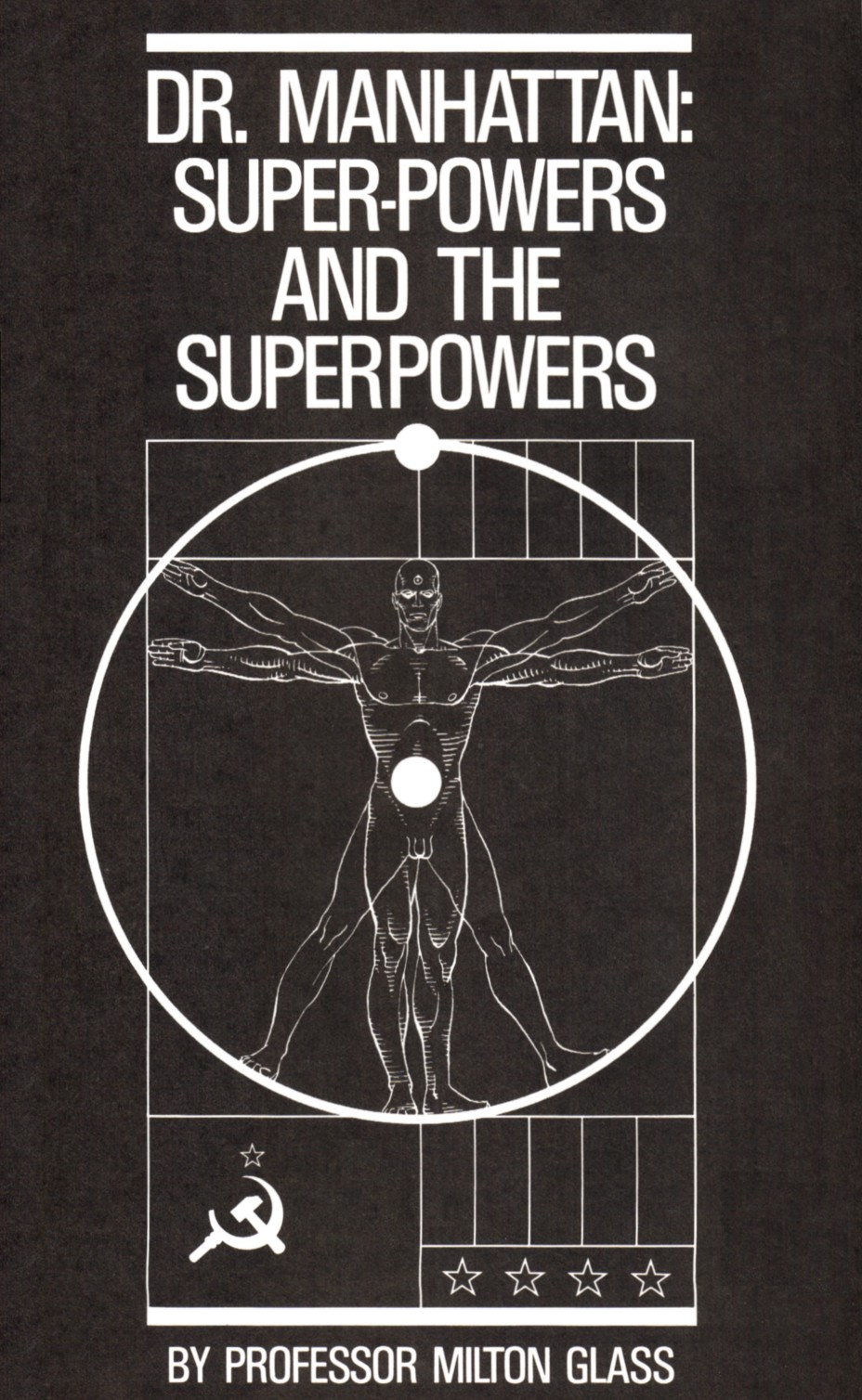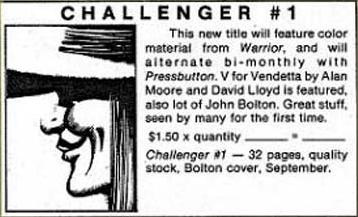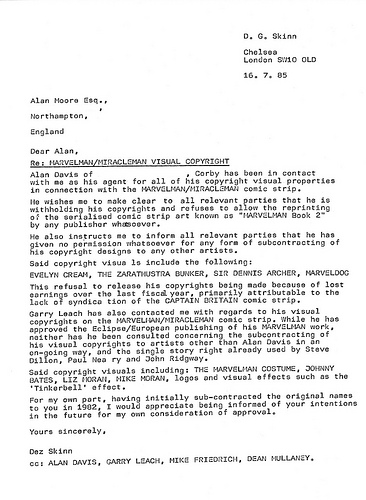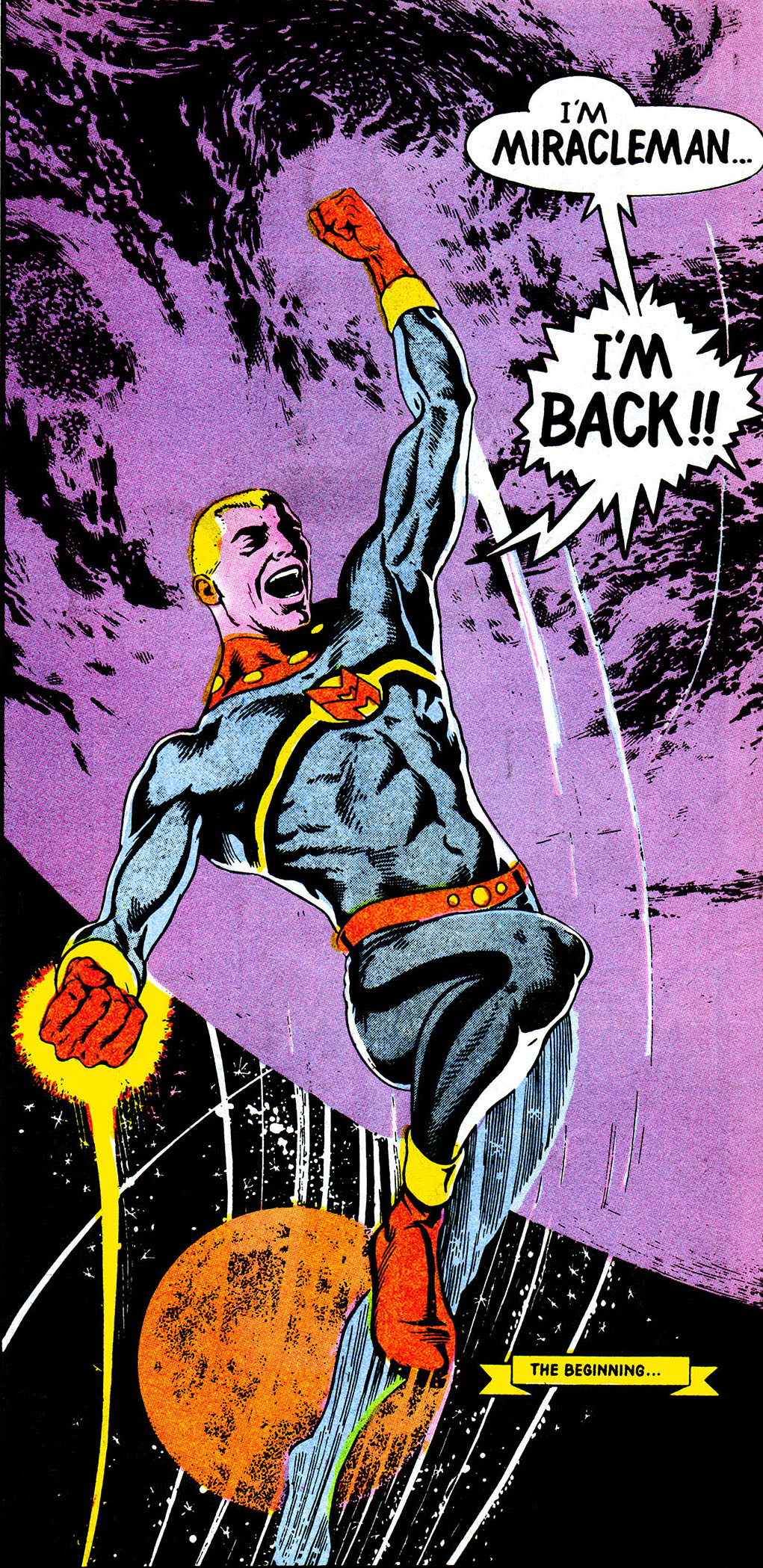While The Past and Future Exist Simultaneously (The Last War in Albion Book Two Part Twenty-Four: Miracleman at Eclipse)
 {Impressively, Alan Moore’s second publisher for Marvelman/Miracleman was an even bigger trainwreck than his first. It is perhaps unsurprising, given this, to find out that Dez Skinn negotiated the bulk of the deal. The financial plan for Warrior had always involved selling the strips to foreign markets, and Skinn was determined to sell them as a package, reasoning that “strips like Spiral Path – which I put into an anthology alongside Shandor and Bojeffries Saga – were not the stars of the show,” but that Warrior would never have happened without them and that they deserved the same shot at foreign publication as the heavy-hitters like V for Vendetta and Laser Eraser and Pressbutton. But ironically, it wasn’t the lesser Warrior material that made selling the strips abroad a challenge, but the nominal crown jewel, Marvelman, as neither of the two biggest comics publishers would touch it. DC was the obvious first choice, since they were already having considerable success publishing Alan Moore in the US market, and were indeed interested, but Dick Giordano pointed out that there was simply no way that they could publish a comic called Marvelman, citing the number of problems they were already having with Captain Marvel, which they’d bought from the smoldering ruins of Fawcett and started publishing under the name Shazam! But the obvious second choice proved no better; Marvel wouldn’t touch it either, pointing out that if they were to publish a strip called Marvelman it would be read as representing the entire company, which was perhaps not quite what they wanted Moore’s psychologically damaged take on superheroes to do.
{Impressively, Alan Moore’s second publisher for Marvelman/Miracleman was an even bigger trainwreck than his first. It is perhaps unsurprising, given this, to find out that Dez Skinn negotiated the bulk of the deal. The financial plan for Warrior had always involved selling the strips to foreign markets, and Skinn was determined to sell them as a package, reasoning that “strips like Spiral Path – which I put into an anthology alongside Shandor and Bojeffries Saga – were not the stars of the show,” but that Warrior would never have happened without them and that they deserved the same shot at foreign publication as the heavy-hitters like V for Vendetta and Laser Eraser and Pressbutton. But ironically, it wasn’t the lesser Warrior material that made selling the strips abroad a challenge, but the nominal crown jewel, Marvelman, as neither of the two biggest comics publishers would touch it. DC was the obvious first choice, since they were already having considerable success publishing Alan Moore in the US market, and were indeed interested, but Dick Giordano pointed out that there was simply no way that they could publish a comic called Marvelman, citing the number of problems they were already having with Captain Marvel, which they’d bought from the smoldering ruins of Fawcett and started publishing under the name Shazam! But the obvious second choice proved no better; Marvel wouldn’t touch it either, pointing out that if they were to publish a strip called Marvelman it would be read as representing the entire company, which was perhaps not quite what they wanted Moore’s psychologically damaged take on superheroes to do.
 |
| Figure 920: An advertisement for the never-published Challenger #1 from Pacific Comics. |
That left smaller companies. Initially the plan was a company called Pacific Comics, but after contracts were signed and the first issue of Challenger, headlined by V for Vendetta, advertised Pacific abruptly went belly up in August of 1984, leaving all of the Warrior properties homeless once again. Ultimately they were acquired, alongside some other remnants of Pacific, by Eclipse Comics, created by siblings Jan and Dean Mullaney, but edited by cat yronwode (lack of capitalization per her wishes), a small publisher originally out of New York, but by this point run out of Guerneville California. But there were still other problems. Not only was Marvel uninterested in publishing Marvelman, they were uninterested in the idea of anyone else publishing him. This started with Marvel UK’s dispute with Skinn over the latter’s decision to break the informal truce they had by actually publishing a comic called Marvelman on the cover instead of featuring him inside Warrior, but rapidly spread to the US branch of the company.
In Moore’s telling, the figure at the heart of the dispute was Jim Shooter, who he characterizes as “one of these comic book industry führers,” which doesn’t actually rate very highly in the list of awful things Jim Shooter has been called by his fellow professionals. Moore was, to say the least, unhappy about this; in his view, Marvelman’s publication history extended further back than Timely/Atlas Comics’s renaming to Marvel, and there was no reason why he should have to change the name of an iconic British superhero to appease a company that had nothing to do with it. Still, he offered a compromise, proposing calling the book Kimota! in the same way that DC was calling their Captain Marvel book Shazam!, but was told by, as he puts it, “people who once meant something at Marvel Comics, and were all-powerful and supreme, and are now probably working in Blockbusters” that this was unacceptable as well. And so he pushed back, declaring that he would forbid reprints of any of his Captain Britain work if Marvel persisted, . As Moore recounts it, at this point industry legend Archie Goodwin stepped in, penning a letter to Shooter in which he appealed for him to “ease up” on Marvelman, which Shooter responded to by crumpling the letter up and tossing in a desk drawer, where it was allegedly found by his successor.
As with many stories recounted by Alan Moore, the details have the distinct sense of having been fiddled by one of the greatest storytellers of his generation. But regardless of whether Jim Shooter didn’t understand how to operate a trash can or not, the conflict with Marvel over the character’s name would have consequences above and beyond the inevitable capitulation and agreement to rename the character Miracleman (a name first proposed by Moore in his initial pitch to Dez Skinn as a suggestion in the event that the Marvelman rights proved troublesome, but ironically first publicly used as a blatant stand-in for Marvelman in the pages of Moore’s Captain Britain run, which means that technically they changed the character to one Marvel had a nominally stronger legal claim about, though nothing came of this detail). But it also led to the breakdown of Alan Moore and Alan Davis’s friendship when Moore carried through on his threat to block Captain Britain reprints. In Davis’s telling, “Alan hadn’t bothered telling me that he’d refused to allow Captain Britain to be reprinted. I found out, sort of like, five months after.” Incensed, Davis decided to retaliate by vetoing reprints of his work on Marvelman.
 |
| Figure 921: Dez Skinn’s 1985 letter advising Moore and Eclipse that they did not have the necessary permissions to reprint Alan Davis’s work. |
Faced with the withdrawal of the artist on what was to be issues #2-6 of their reprints, yronwode did what any responsible editor at a comics company firmly committed to creators’ rights would do in this situation, namely illegally reprint the work anyway. In Davis’s blunt account, “Eclipse, Dez, and Alan all ignored my protests/refusals and my work was stolen,” although the matter is at least somewhat more complex than that; in fact Dez Skinn acted as Davis’s agent in this dispute, penning a letter to Moore and cc:ed to Davis, Leach, Skinn’s American agent Mike Friedrich, and Dean Mullaney in July of 1985, around the time that Miracleman #1 was released in which he bluntly proclaimed that Davis “is withholding his copyrights and refuses to allow the reprinting of the serialised comic strip art known as ‘MARVELMAN Book 2’ by any publisher whatsoever,” and further clarifying that Davis was refusing to allow “any form of subcontracting of his copyright designs to any other artists,” specifically citing Evelyn Cream, the Zarathustra Bunker, Dennis Archer, and Marveldog as designs he was unwilling to let other artists use, and notes that Garry Leach has similarly not approved the use of his designs by other artists. (The letter also cites “lost earnings over the last fiscal year, primarily attributable to the lack of syndication of the CAPTAIN BRITAIN comic strip” as Davis’s reason for refusal, hence its pointedly being addressed to Moore.) yronwode (and presumably Mullaney) were unmoved by this, with yronwode proclaiming shortly thereafter that “Dez Skinn signed a contract with Eclipse allowing us to reprint material from Warrior, and we intend to reprint that material. If Alan Davis granted Dez Skinn the power to make that contract, and has since changed his mind, that is unfortunate for Alan but he is legally bound to that contract. If Dez Skinn represented himself to Eclipse as having the power to represent Alan Davis when in fact he did not, that is a matter for Alan Davis to settle with Dez Skinn. In any event Eclipse will be reprinting the material,” demonstrating Eclipse’s characteristically idiosyncratic understanding of how contracts work.
 |
| Figure 922: Miracleman, incompetently colored the same shade of purple as the planet behind him in the first issue of the Eclipse run. (Written by Alan Moore, art by Gary Leach, originally published in Warrior #1, 1982, colored and republished in Miracleman #1, 1985) |
Skinn, for his part, was already souring rapidly on Eclipse, who had never been the company he wanted to work with anyway. In Skinn’s telling – and note that between Skinn and yronwode this is a story that is long on fabulists – Eclipse immediately became late on payments, and so Skinn began withholding the high quality prints, which Eclipse dealt with by simply making low quality copies from Warrior. (Perversely, Skinn notes, “that made Alan Davis crazy because all the details dropped out.”) Given that Skinn was already (and with good reason) dismayed by the low quality of the first issue, where despite having the high quality artwork they managed to, in the iconic panel of Miracleman proclaiming his return, color his face purple, this was hardly a promising development, and Skinn was surely eager to look for a new publisher that might actually succeed in giving him money.
Eclipse, meanwhile, had moved on to other problems: the material previously published in Warrior ran out midway through Miracleman #6. This posed a problem – as Skinn put it (in the same issue of Speakeasy where yronwode suggested not actually having the rights to Alan Davis’s art was not strictly speaking a problem), “according to our contract, Quality has to supply material to Eclipse up to issue #12.” The problem is that Eclipse’s interest in the new material was predicated on it being written by Alan Moore, who was under no circumstances going to be working with or for Skinn. Skinn, for his part, grumps that this was “something which is not expressly stated in the contract,” but his use of “expressly” highlights the degree to which this is a feeble objection: nobody seriously thought Miracleman (Or, as Moore, dripping with irritation, called him in an essay at the back of Miracleman #2, “M*****man”) was a valuable property except inasmuch as the red-hot writer of Swamp Thing and the forthcoming Watchmen had written for the character. In 1985, at least, Miracleman not written by Alan Moore was essentially worthless.
Eclipse’s solution, ratified in a new contract dated February 1986 (the same month that Miracleman #6 is dated), was to buy the right to produce new Miracleman material from Skinn for a further $8000, payable in three installments, one of which Skinn recounts was given to him at a meeting “with Jan Mullaney – Dean’s brother – in New York, in some really seedy bar. He turned up looking like a real hippie with a couple thousand dollars in cash in a brown envelope. And I’m sitting there, this sort of funny Englishman in this really scary place and he comes in and this is like some dodgy transaction taking place as he slides the envelope over to me with a couple thousand dollars or more in cash and he says, ‘you will count it, won’t you?’” [continued]

January 29, 2016 @ 6:57 pm
“…But regardless of whether Jim Shooter didn’t understand how to operate a trash can or not…”
lol you bitch.
“…Moore, dripping with irritation, called him in an essay at the back of Miracleman #2, ‘M*****man.’”
lol that bitch.
Forget the 9/11 road trip movie about Liz Taylor and Michael Jackson, a movie about Alan Moore’s shenanigans and machinations in the 80’s comic book industry is the fantastical non-bio I’d rather see. Sinister dealings, magicians, Marvel being nefarious, people with no capital letters and many, many soured friendships, all maybe interspersed with psychedelic tuber sex…
Incidentally, I’m kinda digging the purple face. It works. (I remember when I was a theater manager at a Regal, I accidentally built a print of “The Prestige” in the wrong order. No one noticed for almost two weeks, and I always wondered if it didn’t measurably improve the film.)
Oh, and Phil…I can’t wait for the next ebook of “The Last War In Albion.” I’ll be shameless here for you: to anyone reading this wondering if the book versions of either this or the TARDIS Eruditorum, the extra essays in the Davison/Baker volume I downloaded last night are alone worth the admission price. Go. Buy.
January 29, 2016 @ 7:31 pm
That is a truly remarkable bit of doublethink on Eclipse’s part.
“Look, I bought this watch in good faith. If you’re saying the person who sold it to me stole it from you, that sounds like something you need to take up with them, but I paid for it, so it’s my watch.”
February 1, 2016 @ 1:20 am
Actually, “bona fide purchaser in good faith” is a legal concept recognized in most common law jurisdictions. I’m not persuaded that it applies under these facts, but it’s not an utterly absurd idea in the abstract.
February 9, 2016 @ 10:50 am
Great stuff, and I had only a little idea how wrangled a life Marvel/Miracleman had gone through. Loving this series of posts as they hook right into a time when I was reading with a friend the Alan Moore comics – very nostalgic.
February 9, 2016 @ 10:52 am
And many thanks to the computer wizard – Anna is it? – on the site as I was easily able to post my comment after months of hassle. Good work!
April 28, 2016 @ 11:23 am
Truly a wonderful piece of writing and I loved the way you have contributed some effective information here. It brings lots of new thoughts and ideas of the topic to me and hence I can be thankful for your real efforts here. I do work for an essay writing firm and hence I often get engaged with writing projects of this theme. It will surely help me to have new ideas and hence become contributory in my project handling next time based on this kind of topics. Your writing style is what making this piece impressive as the important points are well covered at ease.
Regards,
Sunny Elvis
Writer at http://cheapessaywritingservice.co.uk
May 25, 2016 @ 12:11 pm
I like the way that this book is written from fantasy but the author makes it sounds so real. It is very hard to imagine how the present and the future could exist simultaneously but the ingenuity of the author allow him to bring out this concept so clearly.
Thanks,
Writer at: https://www.literaturereviewhelp.com/9-custom-writing/911-expert-article-review-help